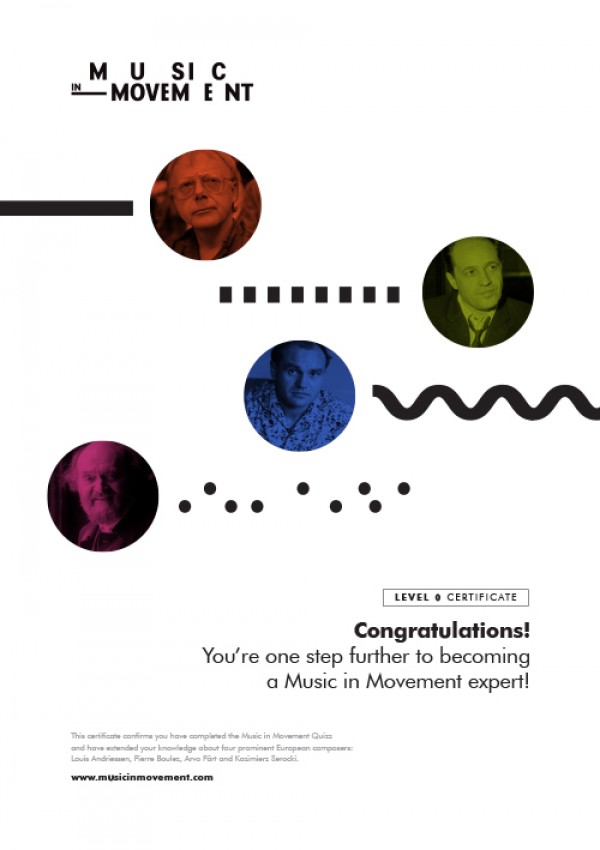MiM quiz – Explorer level / Education
Remember, this quiz is not about testing your knowledge about contemporary music. It's all about getting to know the four composers - their music, techniques, but also inspirations and private stories. We invite you to take on this challenge - discover the universe of four personalities and dive in into their music.
The four composers not only composed songs. To a smaller or bigger extent they also tried to influence the shape of the musical life in their countries and globally. To whom do the following statements refer?
Among Pierre Boulez's most important achievements are not only the artistic ones but also the creation of IRCAM, Ensemble Intercontemporain as a model of a new music ensemble and concert halls adapted to unconventional music performances, which he designed together with the architect Frank Gehry.
In the 60's and 70's Louis Andriessen, together with other artists, used to attack what he regarded as bourgeois and outdated forms of concert life, which he wanted to replace by the modes much better adapted to the needs of the modern society.
Hollywood but also indie directors like to use the magical music of Arvo Pärt to soundtrack their films. But he has not made any significant efforts towards influencing music life through creation or being part of institutions
Kazimierz Serocki was one of the founding fathers of the International Festival of Contemporary Music in Warsaw, referred to as “Warsaw Autumn”,
Read more about the "Warsaw Autumn Festival".
The music of the four composers is usually heard in traditional concert halls, yet each of them felt the need to go beyond the typical limitations of such venues, and three of them wrote pieces intended to be performed in other, more appropriate spac
Kazimierz Serocki saw the need to use new spaces for new music, but this was not reflected in his work. Apart from the suggestion that Arrangements can be performed simultaneously in different parts of the same building.
Religious buildings are natural venues for Arvo Pärt’s music.
Louis Andriessen put his understanding of the political role of music into practice with e.g. the Volharding ensemble, with which he gave street performances.
Pierre Boulez believed that new music required new spaces and to make his visions a reality he collaborated with well-known architects.
Vocal music - who composed this musical piece?
Listen to the short excerpt and recognize the composer.
The example comes from Pierre Boulez – Pli selon pli.
The example comes from Louis Andriessen La passione.
The example comes from Arvo Pärt – Kanon pokajanen.
The example comes from Kazimierz Serocki Poesies.
Which composers visited the International Summer Course for New Music in Darmstadt?
Since 1946 the International Summer Course for New Music in Darmstadt has been the most important meeting place for composers interested in new phenomena in music. For two of the Four Composers the Darmstadt course was an important place in their artistic biographies, for the remaining two – not at all. Which composers visited the course?
In 1958 Musica concertante (1958) by Kazimierz Serocki was the first ever piece by a Polish composer to be premiered during the Internationale Ferienkurse für Neue Musik in Darmstadt. In the 1950s PB, Karlheinz Stockhausen and Luigi Nono were considered to be leading young avant-garde composers, for whom the Summer Course in Darmstadt remained for a while the most important forum for presenting their own music and concepts.
Orchestral music - who composed this musical piece?
Listen to the short excerpt and recognize the composer.
Instrumental color scheme also plays a major role in Pli selon pli composed by Pierre Boulez, but this piece sounds quite different from Serocki’s music. Boulez saw the precise pitch as equally important as harmony arrangements.
In Ad libitum the nature of the music resembles that of colour fantasia, like in many of Krzysztof Serocki’s works.
A vivid, though by no means simple rhythm, sound of the orchestra favouring the brass rather than the strings suggest Louis Andriessen – the example is taken from his Mysterien.
Consonant chords, melody and harmony bringing to mind Renaissance music in Arvo Pärt’s 3. Symphony are characteristics of many of his works.
Chamber music - which of the four composers wrote this musical piece?
Listen to the short exceprt and recognise the composer.
The example comes from Louis Andriessen Zilver.
The example comes from Kazimierz Serocki Swinging Music.
The example comes from Arvo Pärt – Es sang vor langen Jahren.
The example comes from Pierre Boulez – Le marteau sans maître.
Well done!
We hope you enjoyed the experience!
You can now share & save your MiM certificate!

